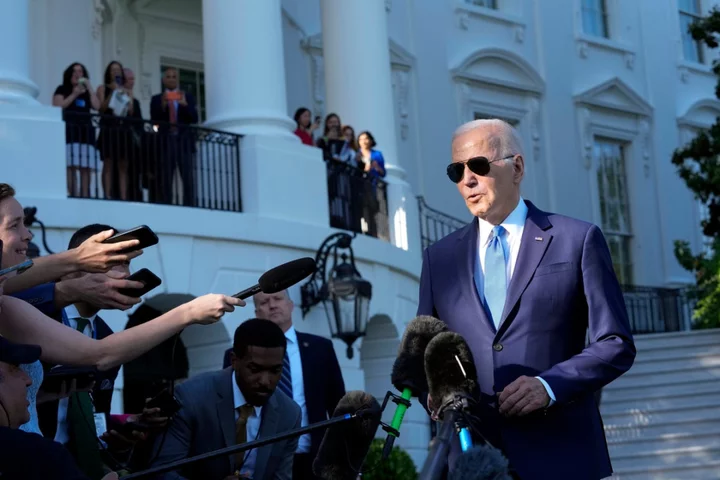
Biden says debt deal 'very close' even as two sides far apart on work requirements
Work requirements for federal food aid recipients have emerged as a final sticking point in negotiations over the looming debt crisis, even as President Joe Biden said Friday that a deal is “very close.” Biden’s optimism came as the deadline for a potentially catastrophic default was pushed back to June 5 and seemed likely to drag negotiations between the White House and Republicans over raising the debt ceiling into another frustrating week. Both sides have suggested one of the main holdups is a GOP effort to boost work requirements for recipients of food stamps and other federal aid programs, a longtime Republican goal Democrats have strenuously opposed. Even as they came closer to a framework on spending, each side seemed dug in on the work requirements. White House spokesman Andrew Bates called the GOP proposals “cruel and senseless” and said Biden and Democrats would stand against them. Louisiana Rep. Garret Graves, one of House Speaker Kevin McCarthy’s negotiators, was blunt when asked if Republicans might relent on the issue: "Hell no, not a chance,” he said. The later “ X-date,” laid out in a letter from Treasury Secretary Janet Yellen, set the risk of a devastating default four days beyond an earlier estimate. Still, Americans and the world uneasily watched the negotiating brinkmanship that could throw the U.S. economy into chaos and sap world confidence in the nation’s leadership. Yet Biden was upbeat as he left for the Memorial Day weekend at Camp David, declaring, “It’s very close, and I’m optimistic.” With Republicans at the Capitol talking with Biden’s team at the White House, the president said: “There’s a negotiation going on. I’m hopeful we’ll know by tonight whether we’re going to be able to have a deal.” But a deal had not come together when McCarthy left the Capitol Friday evening. In a blunt warning, Yellen said failure to act by the new date would “cause severe hardship to American families, harm our global leadership position and raise questions about our ability to defend our national security interests.” Anxious retirees and others were already making contingency plans for missed checks, with the next Social Security payments due next week. Biden and Republican McCarthy have seemed to be narrowing on a two-year budget-slashing deal that would also extend the debt limit into 2025 past the next presidential election. But talks over the proposed work requirements for recipients of Medicaid, food stamps and other aid programs seemed at a standstill Friday afternoon. Biden has said the Medicaid work requirements would be a nonstarter. But he initially seemed open to possible changes on food stamps, now known as the Supplemental Nutrition Assistance Program, or SNAP. The Republican proposal would save $11 billion over 10 years by raising the maximum age for existing standards that require able-bodied adults who do not live with dependents to work or attend training programs. While current law applies those standards to recipients under the age of 50, the House bill would raise the age to include adults 55 and under. The GOP proposal would also decrease the number of exemptions that states can grant to some recipients subject to those requirements. Biden's position on the SNAP work requirements appeared to have hardened by Friday, when spokesman Bates said House Republicans are threatening to trigger an unprecedented recession “unless they can take food out of the mouths of hungry Americans.” Any deal would need to be a political compromise, with support from both Democrats and Republicans to pass the divided Congress. Failure to lift the borrowing limit, now $31 trillion, to pay the nation’s incurred bills, would send shockwaves through the U.S. and global economy. But many of the hard-right Trump-aligned Republicans in Congress have long been skeptical of Treasury’s projections, and they are pressing McCarthy to hold out. As talks pushed into another late night, one of the negotiators, Rep. Patrick McHenry, R-N.C., called Biden’s comments “a hopeful sign.” But he also cautioned that there’s still “sticky points” impeding a final agreement. While the contours of the deal have been taking shape to cut spending for 2024 and impose a 1% cap on spending growth for 2025, the two sides remain stuck on various provisions. House Republicans had pushed the issue to the brink, displaying risky political bravado in leaving town for the Memorial Day holiday. Lawmakers are tentatively not expected back at work until Tuesday, but now their return is uncertain. Weeks of negotiations between Republicans and the White House have failed to produce a deal — in part because the Biden administration resisted negotiating with McCarthy over the debt limit, arguing that the country’s full faith and credit should not be used as leverage to extract other partisan priorities. “We have to spend less than we spent last year. That is the starting point,” said McCarthy. One idea is to set the topline budget numbers but then add a “snap-back” provision to enforce cuts if Congress is unable during its annual appropriations process to meet the new goals. Lawmakers are all but certain to claw back some $30 billion in unspent COVID-19 funds now that the pandemic emergency has officially been lifted. McCarthy has promised lawmakers he will abide by the rule to post any bill for 72 hours before voting. The Democratic-held Senate has vowed to move quickly to send the package to Biden’s desk. ___ Associated Press writers Mary Clare Jalonick, Stephen Groves, Farnoush Amiri, Seung Min Kim and Kevin Freking and videojournalist Rick Gentilo contributed to this report. Read More Ukraine war’s heaviest fight rages in east - follow live Charity boss speaks out over ‘traumatic’ encounter with royal aide Lauren Boebert claims Biden plan to combat antisemitism will target ‘conservatives’ Defense secretary tells Navy graduates they are ready to serve Doctor's supporters, hospital at odds with Indiana penalty for talking about 10-year-old's abortion
2023-05-27 12:20
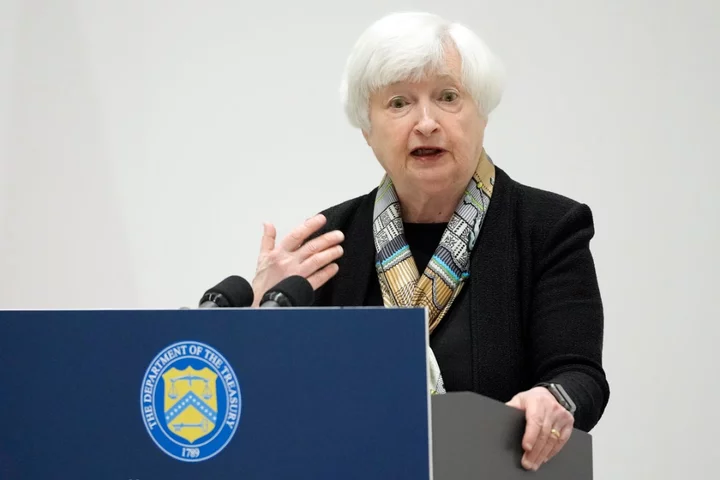
Deadline looming, Biden and McCarthy narrow in on budget deal to lift debt ceiling
Days from a deadline, President Joe Biden and House Speaker Kevin McCarthy are narrowing in on a two-year budget deal aiming to curb federal deficits in exchange for lifting the nation's debt ceiling and staving off an economically devastating government default. The Democratic president and Republican speaker hope to strike a budget compromise this weekend. With Republicans driving for steep cuts, the two sides have been unable to agree to spending levels for 2024 and 2025. Any deal would need to be a political compromise, with support from both Democrats and Republicans to pass the divided Congress. But the budget flow isn't the only hang-up. A person familiar with the talks said the two sides are “dug in” on whether or not to agree to Republican demands to impose stiffer work requirements on people who receive government food stamps, cash assistance and health care aid, some of the most vulnerable Americans. Yet both Biden and McCarthy expressed optimism heading into the weekend that the gulf between their positions could be bridged. A two-year deal would raise the debt limit for that time, past the 2024 presidential election. “We knew this would not be easy," McCarthy, R-Calif., said as he left the Capitol for the evening Thursday. McCarthy said, "It’s hard, but we’re working and we’re going to continue to work until we get this done.” House Republicans have pushed the issue to the brink, displaying risky political bravado in leaving town for the Memorial Day holiday. The U.S. could face an unprecedented default as soon as June 1, hurling the global economy into chaos. In remarks at the White House, Biden said, “It’s about competing versions of America.” “The only way to move forward is with a bipartisan agreement,” Biden said Thursday. “And I believe we’ll come to an agreement that allows us to move forward and protects the hardworking Americans of this country.” Lawmakers are tentatively not expected back at work until Tuesday, just two days from the early June deadline when Treasury Secretary Janet Yellen has said the U.S. could start running out of cash to pay its bills and face a federal default. Biden will also be away this weekend, departing Friday for the presidential retreat at Camp David, Maryland, and Sunday for his home in Wilmington, Delaware. The Senate is on recess and will be until after Memorial Day. Meanwhile, Fitch Ratings agency placed the United States’ AAA credit on “ratings watch negative,” warning of a possible downgrade. Weeks of negotiations between Republicans and the White House have failed to produce a deal — in part because the Biden administration resisted negotiating with McCarthy over the debt limit, arguing that the country's full faith and credit should not be used as leverage to extract other partisan priorities. The White House has offered to freeze next year's 2024 spending at current levels and restrict 2025 spending, but the Republican leader says that's not enough. “We have to spend less than we spent last year. That is the starting point,” said McCarthy. One idea is to set those topline budget numbers but then add a “snap-back” provision that enforces the cuts if Congress is unable during its annual appropriations process to meet the new goals. On work requirements for the aid recipients, the White House is particularly resisting measures that would drive Americans into poverty or take their health care, said the person familiar with the talks, who was granted anonymity to describe behind-closed-door discussions. On the Republican demand to rescind money for the Internal Revenue Service, it's still an “open issue” whether the sides will compromise by allowing the funding to be pushed back into other domestic programs, the person said. Pressure is bearing down on McCarthy from the House's right flank not to give in to any deal, even if it means blowing past the June 1 deadline. “Let’s hold the line,” said Rep. Chip Roy, R-Texas, a Freedom Caucus member. McCarthy said Donald Trump, the former president who is again running for office, told him, “Make sure you get a good agreement.” Failure to raise the nation’s debt ceiling, now at $31 trillion, to pay America's already incurred bills would risk a potentially chaotic federal default. Anxious retirees and social service groups are among those already making default contingency plans. Even if negotiators strike a deal in coming days, McCarthy has promised lawmakers he will abide by the rule to post any bill for 72 hours before voting — now likely Tuesday or even Wednesday. The Democratic-held Senate has vowed to move quickly to send the package to Biden’s desk, right before next Thursday's possible deadline. In one potential development, Republicans may be easing their demand to boost defense spending, instead offering to keep it at levels the Biden administration proposed, according to another person familiar with the talks. The teams are also eyeing a proposal to boost energy transmission line development from Sen. John Hickenlooper, D-Colo., that would facilitate the buildout of an interregional power grid, according to a person familiar with that draft. Those two people were also granted anonymity to discuss the private negotiations. The White House has continued to argue that deficits can be reduced by ending tax breaks for wealthier households and some corporations, but McCarthy said he told the president as early as their February meeting that raising revenue from tax hikes was off the table. While Biden has ruled out, for now, invoking the 14th Amendment to raise the debt limit on his own, Democrats in the House announced they have all signed on to a legislative “discharge” process that would force a debt ceiling vote. But they need five Republicans to break with their party and tip the majority to set the plan forward. They are all but certain to claw back some $30 billion in unspent COVID-19 funds now that the pandemic emergency has officially been lifted. ___ Associated Press writers Chris Megerian, Josh Boak, Zeke Miller and Mary Clare Jalonick contributed to this report. Read More Ukraine war’s heaviest fight rages in east - follow live Charity boss speaks out over ‘traumatic’ encounter with royal aide US Park Police investigate attack on Australian journalists Biden releases new strategy to tackle rise in antisemitism, says 'hate will not prevail' On 3rd anniversary of George Floyd's death, Biden stops GOP-led effort to block DC police reform law
2023-05-26 12:18
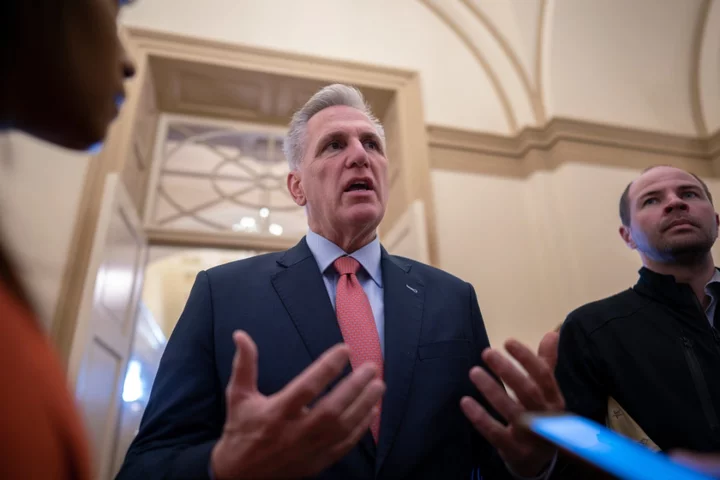
McCarthy's Republicans push debt ceiling talks to brink, lawmakers leaving town for weekend
House Republicans are pushing debt ceiling talks to the brink, displaying risky political bravado as they prepare to leave town Thursday for the holiday weekend just days before the U.S. could face an unprecedented default that could hurl the global economy into chaos. A defiant House Speaker Kevin McCarthy said the debt ceiling standoff was “not my fault” as Republican negotiators and the White House failed to finish out talks. He warned they need more time to try to reach a budget-slashing deal with President Joe Biden. But it's clear the Republican speaker — who leads a Trump-aligned party whose hard-right flank lifted him to power — is now staring down a potential crisis. Lawmakers are tentatively not expected back at work until Tuesday, just two days from June 1, when Treasury Secretary Janet Yellen has said the U.S. could start running out of cash to pay its bills and face a potentially catastrophic default. Fitch Ratings agency placed the United States’ AAA credit on “ratings watch negative,” warning of a possible downgrade because of what it called the brinkmanship and political partisanship surrounding the debate over lifting the debt ceiling. "This is a battle between extremism and common sense,” said Democratic Rep. Katherine Clark of Massachusetts, the minority whip. The Republicans, she said, "want the American people to make an impossible choice: devastating cuts or devastating debt default.” Weeks of negotiations between Republicans and the White House have failed to produce a deal — in part because the Biden administration never expected to be having to negotiate with McCarthy over the debt limit, arguing it should not be used as leverage to extract other partisan priorities. McCarthy is holding out for steep spending cuts that Republicans are demanding in exchange for their vote to raise the nation's borrowing limit. The White House has offered to freeze next year's 2024 spending at current levels, but the Republican leader says that's not enough. “We have to spend less than we spent last year. That is the starting point," said McCarthy, R-Calif. Failure to raise the nation’s debt ceiling, now at $31 trillion, would risk a potentially chaotic federal default, almost certain to inflict economic turmoil at home and abroad. Anxious retirees and social service groups are among those already making default contingency plans. Even if negotiators strike a deal in coming days, McCarthy has promised lawmakers he will abide by the rule to post any bill for 72 hours before voting — now likely Tuesday or even Wednesday. The Senate, where Democratic Majority Leader Chuck Schumer has vowed to move quickly, would also have to pass the package before it could go to Biden’s desk to be signed into law, right before next Thursday's possible deadline. The contours of a deal have been within reach for days, but Republicans are unsatisfied as they press the White House team for more. In one potential development, Republicans may be easing their demand to boost defense spending, instead offering to keep it at levels the Biden administration proposed, according to one person familiar with the talks and granted anonymity to discuss them. The Republicans may achieve their goal of of rolling back bolstered funding for the Internal Revenue Service if they agree to instead allow the White House to push that money into other domestic accounts, the person said. At the White House, press secretary Karine Jean-Pierre blamed Republicans for risking a devastating default that would hit “every single part of the country” as they demand “extreme" spending cuts that would hurt millions of Americans. She decried what the administration called a “manufactured crisis” set in motion by the GOP. The White House has continued to argue that deficits can be reduced by ending tax breaks for wealthier households and some corporations, but McCarthy said he told the president as early as their February meeting that raising revenue from tax hikes was off the table. Donald Trump, the former president who is again running for office, has encouraged Republicans to “do a default” if they don’t get the deal they want from the White House. Time is short to strike a deal. Yellen said Wednesday that “it seems almost certain” that without a deal the United States would not make it past early June without defaulting. “We are seeing some stress already in Treasury markets,” she said at a Wall Street Journal event. While Biden has ruled out, for now, invoking the 14th Amendment to raise the debt limit on his own, Democrats in the House announced they have all signed on to a legislative “discharge” process that would force a debt ceiling vote. But they need five Republicans to break with their party and tip the majority to set the plan forward. “Sign the bill!” Democrats yelled on the House floor after Republican Majority Leader Steve Scalise of Louisiana announced the holiday recess schedule. Agreement on a topline spending level is vital. It would enable McCarthy to deliver spending restraints for conservatives while not being so severe that it would chase off the Democratic votes that would be needed in the divided Congress to pass any bill. But what, if anything, Democrats would get if they agreed to deeper spending cuts than Biden's team has proposed is uncertain. McCarthy and his Republican negotiators said what the Democrats get is a debt ceiling increase — typically something both parties take responsibility for doing. “The problem is not the White House. The problem is Kevin McCarthy and the extreme Republicans,” said Rep. Pramila Jayapal, D-Wash., the chair of the progressive caucus. “They are the ones holding this economy hostage, that are putting all these cuts on the American people.” The negotiators are now also debating the duration of a 1% cap on annual spending growth going forward, with Republicans dropping their demand for a 10-year cap to six years, but the White House offering only one year, for 2025. Republicans want to beef up work requirements for government aid to recipients of food stamps, cash assistance and the Medicaid health care program that the Biden administration says would impact millions of people who depend on assistance. All sides have been eyeing the potential for the package to include a framework to ease federal regulations and speed energy project developments. They are all but certain to claw back some $30 billion in unspent COVID-19 funds now that the pandemic emergency has officially been lifted. The White House has countered by proposing to keep defense and nondefense spending flat next year, which would save $90 billion in the 2024 budget year and $1 trillion over 10 years. ___ Associated Press writers Seung Min Kim, Fatima Hussein, Kevin Freking and Darlene Superville contributed to this report. Read More Ukraine war’s heaviest fight rages in east - follow live Charity boss speaks out over ‘traumatic’ encounter with royal aide Georgia nuclear rebirth arrives 7 years late, $17B over cost Wisconsin trial over fake electors set to start just before 2024 presidential election On 1st anniversary of Uvalde, Texas, school shooting, Biden will push for more gun control
2023-05-25 12:51
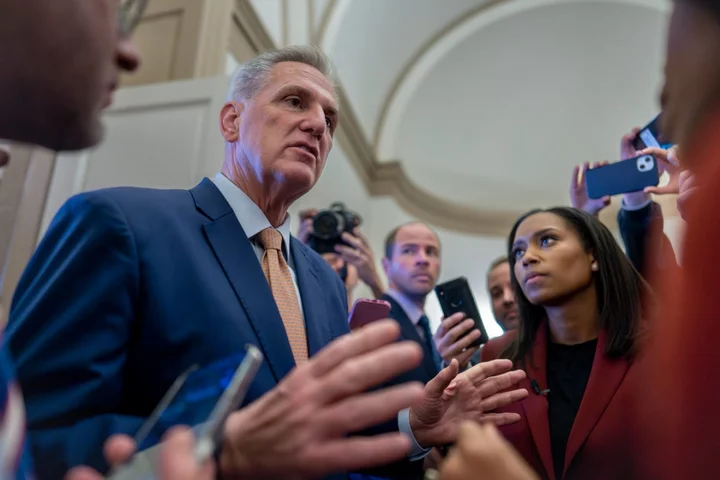
Debt ceiling talks stuck on classic problem: Republicans demand spending cuts and Democrats resist
Debt ceiling negotiations are locked on a classic problem that has vexed, divided and disrupted Washington before: Republicans led by House Speaker Kevin McCarthy want to roll back federal government spending, while President Joe Biden and other Democrats do not. Time is short to strike a deal before a deadline as soon as June 1, when the Treasury says the government risks running out of cash to pay its bills. Negotiators are expected to convene Wednesday for another round of talks as frustration mounts. The political standoff is edging the country closer to a crisis, roiling financial markets and threatening the global economy. “They’ve got to acknowledge that we’re spending too much,” said McCarthy. Cheered on by a hard-charging conservative House majority that hoisted him to power, McCarthy, R-Calif., was not swayed by a White House counter-offer to freeze spending instead. “A freeze is not going to work,” McCarthy said. The longstanding Washington debate over the size and scope of the federal government now has just days to be resolved. Failure to raise the nation's debt ceiling, now at $31 trillion, would risk a potentially chaotic federal default, almost certain to inflict economic turmoil at home and abroad. From the White House, press secretary Karine Jean-Pierre said it was “ridiculous” to suggest Biden wasn’t acting with urgency after Republicans complained about the pace. “He wants to see this done as soon as possible,” she said. Dragging into a third week, the negotiations over raising the nation's debt limit were never supposed to arrive at this point. The White House insisted early on it was unwilling to barter over the need to pay the nation’s bills, demanding that Congress simply lift the ceiling as it has done many times before with no strings attached. But the newly elected speaker visited Biden at the Oval Office in February, urging the president to come to the negotiating table on a budget package that would reduce spending and the nation’s ballooning deficits in exchange for the vote to allow future debt. “I told the president Feb. 1," McCarthy recounted. "I said, Mr. President, you’re not going to raise taxes. You've got to spend less money than was spent this year.” Negotiations are focused on finding agreement on a 2024 budget year limit. Republicans have set aside their demand to roll back spending to 2022 levels, but say that next year’s government spending must be less than it is now. But the White House instead offered to freeze spending at current 2023 numbers. “We are holding firm to the speaker’s red line,” said a top Republican negotiator, Rep. Garret Graves of Louisiana. “Which is that we will not do a deal unless it spends less money than we’re spending this year.” By sparing defense and some veterans accounts from reductions, the Republicans would shift the bulk of spending reductions to other federal programs, an approach that breaks a tradition in Congress of budget cap parity. Graves said there were still “significant gaps” between his side and the White House. Agreement on that topline spending level is vital. It would enable McCarthy to deliver spending restraints for conservatives while not being so severe that it would chase off the Democratic votes that would be needed in the divided Congress to pass any bill. But what, if anything, Democrats would get if they agreed to deeper spending cuts than Biden's team has proposed is uncertain. Asked what concessions the Republicans were willing to give, McCarthy quipped, “We’re going to raise the debt ceiling.” The White House has continued to argue that deficits can be reduced by ending tax breaks for wealthier households and some corporations, but McCarthy said he told the president at their February meeting that raising revenue from tax hikes is off the table. The negotiators are now also debating the duration of a 1% cap on annual spending growth going forward, with Republicans dropping their demand for a 10-year cap to six years, but the White House offering only one year, for 2025. Typically, the debt ceiling has been lifted for the duration of a budget deal, and in this negotiation the White House is angling for a two-year agreement that would push past the presidential elections. Past debt ceiling talks have produced budget agreements in which both parties have won some concessions in a give and take. Both have wanted to raise the debt limit to prevent a economy-shattering federal default. Graves explained the Republican position this time around. Since Biden already boosted federal spending in significant ways with his COVID-19 rescue package, Inflation Reduction Act and other bills, “they've already got theirs.” “We’re willing to give them an increase in debt ceiling. That’s what they’re getting,” he said. And yet, the Republicans are pushing additional priorities as the negotiators focus on the $100 billion-plus difference between the 2022 and 2023 spending plans as a place to cut. Republicans want to beef up work requirements for government aid to recipients of food stamps, cash assistance and the Medicaid health care program that the Biden administration says would impact millions of people who depend on assistance. All sides have been eyeing the potential for the package to include a framework to ease federal regulations and speed energy project developments. They are all but certain to claw back some $30 billion in unspent COVID-19 funds now that the pandemic emergency has officially lifted. The White House has countered by keeping defense and nondefense spending flat next year, which would save $90 billion in the 2024 budget year and $1 trillion over 10 years. The House speaker promised lawmakers he will abide by the rule to post any bill for 72 hours before voting, making any action doubtful until the weekend — just days before the potential deadline. The Senate would also have to pass the package before it could go to Biden's desk to be signed. McCarthy faces a hard-right flank in his own party that is likely to reject any deal, and that has led some Democrats to encourage Biden to resist any compromise with the Republicans and simply invoke the 14th Amendment to raise the debt ceiling on his own, an unprecedented and legally fraught action the president has resisted for now. ___ Associated Press writers Farnoush Amiri, Stephen Groves, Kevin Freking, Chris Megerian, Darlene Superville and Mary Clare Jalonick contributed to this report. Read More Ukraine war’s heaviest fight rages in east - follow live Charity boss speaks out over ‘traumatic’ encounter with royal aide Just in case: Anxious retirees, social service groups among those making default contingency plans Marjorie Taylor Greene pays $100k for chapstick used by Kevin McCarthy Debt ceiling talks grind on, but Republicans say there's a 'lack of urgency' from White House
2023-05-24 12:54
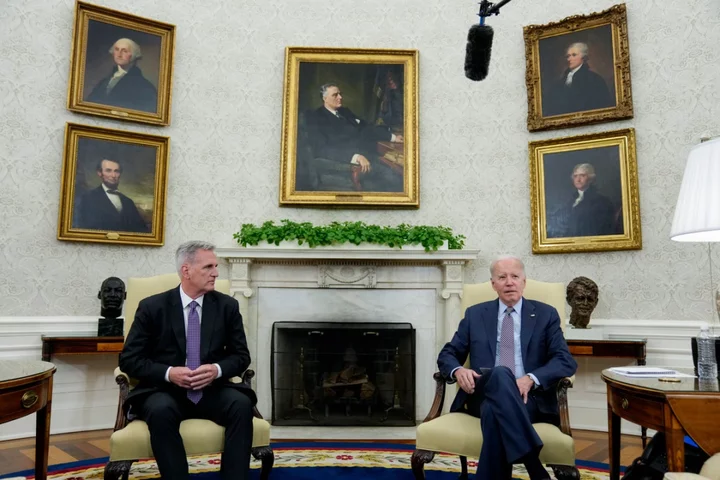
Biden ‘optimistic’ as McCarthy arrives for last-ditch debt talks
President Joe Biden on Monday said he was “optimistic” about the chances of finding an agreement with the Republican-led House of Representatives that would avoid a catastrophic default on America’s sovereign debt. Speaking at the outset of a crucial meeting with House Speaker Kevin McCarthy, Mr Biden said the source of his optimism was a shared agreement between the two men that a debt default is “off the table”. Mr Biden also said the consequences that would arise should the US fail to meet its’ outstanding debt obligations would be “a kick in the ... economic well-being” for the American people. The negotiating session between the president and House speaker comes with just ten days remaining before the US Treasury is set to lose the ability to pay its’ bills by issuing new bonds. In a letter to Congress, Treasury Secretary Janet Yellen said on Monday that “it is highly likely” that the Treasury would run out of operating funds in the event that Congress does not raise the department’s statutory debt limit. A default on America’s sovereign debt would be a financial catastrophe both for Americans and people around the world who rely on US financial stability. Mr Biden said he and Mr McCarthy “talked about the need for bipartisan agreement” and stressed that he was “optimistic” that he and Mr McCarthy were “going to make some progress” during the Monday evening session. For his part, the House Speaker said he and Mr Biden had a “very productive” conversation during a phone call held on Sunday while Mr Biden was returning to Washington from the G7 summit aboard Air Force One. Earlier in the day, Mr McCarthy told reporters at the Capitol that “decisions have to start being made” on spending for the next fiscal year since “we’re 10 days out” from the debt ceiling deadline. “We have to spend less next year than we spent this year,” he said before pointing to the House’s proposal for spending cuts as the “framework” for a deal. “I’m hopeful,” he added. Read More Watch live: Biden and McCarthy meet to discuss US debt ceiling Who is Tim Scott? 5 things to know about the newest 2024 GOP presidential candidate A timeline of Donald Trump’s rivalry with Ron DeSantis
2023-05-23 06:59
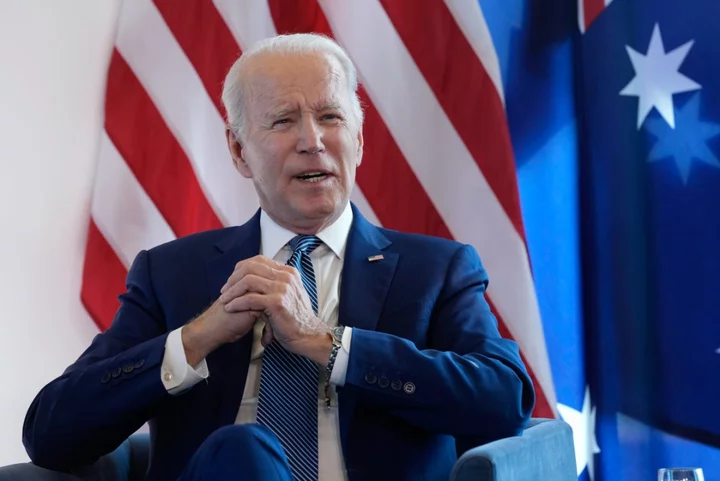
Biden and McCarthy to resume talks Monday as debt ceiling deadline looms
President Joe Biden spoke with House Speaker Kevin McCarthy on Sunday and agreed they would meet on Monday afternoon to try to break the stalemate over legislation to raise the national debt limit. A call took place, according to a White House readout, which gave no indication to the tone of the discussion. Mr McCarthy characterised the call as “productive” in a comment to reporters. A day earlier, the Speaker said negotiations had taken a step backward following Mr Biden’s remarks that he believed the 14th Amendment could be used to circumvent Congress on the issue. “I don’t think we’re going to be able to move forward until the president can get back into the country,” Mr McCarthy said on Saturday. “Just from the last day to today they’ve moved backwards. They actually want to spend more money than we spend this year.” Mr Biden’s call with Mr McCarthy took place while the president was on Air Force One bound for the US on Sunday. He had cut short his attendance at the G7 summit in Japan in order to lead negotiations with Republicans on the issue. During an appearance on Sunday show, Meet the Press, Treasury Secretary Janet Yellen once again warned that the federal government is projected to run out of money on or about 1 June. Should the US be unable to pay its outstanding obligations to debt holders, or even raise questions about its ability to do so, it risks a downgrade of the US’s credit rating which would affect interest rates on future loans. The last official downgrading of the United States’s credit rating occurred in 2011, when Standard and Poor’s dropped the US’s rating from “AAA” to “AA+”. “I indicated in my last letter to Congress that we expect to be unable to pay all of our bills in early June and possibly as soon as June 1. And I will continue to update Congress, but I certainly haven’t changed my assessment. So I think that that’s a hard deadline,” Sec. Yellen said. She added that the possibilty was “quite low” that the US could extend its ability to pay its obligations through 15 June - referencing remarks made by Republicans who suggested Treasury could maneuver past a 1 June deadline without hitting a default. ”[I]t’s hard to be absolutely certain about this, but my assessment is that the odds of reaching June 15th, while being able to pay all of our bills, is quite low,” said Ms Yellen. “[M]y assumption is that if the debt ceiling isn’t raised, there will be hard choices to make about what bills go unpaid.” Mr Biden has been roundly accused by conservatives of refusing to negotiate cuts to federal spending ahead of the debt ceiling deadline. The White House, meanwhile, has blamed Republicans for putting the country’s credit rating at risk. Earlier on Sunday, the president spoke at a press conference and did not indicate that he was completely opposed to reaching a compromise with Republicans on spending levels, though he warned that the GOP must be willing to move in his direction as well. “It’s time for Republicans to accept that there’s no bipartisan deal to be made solely — solely — on their partisan terms,” said Mr Biden. “They have to move as well.” Read More ‘Putin will not break our resolve,’ Joe Biden tells G7 Top House negotiator on debt limit says it's time to 'press pause' as talks come to standstill Biden meeting with Indo-Pacific leaders at G7 summit while confronting stalemate over US debt limit Debt ceiling showdown: Biden and congressional leaders to meet as McCarthy pushes for faster deal Most say pair debt limit increase with deficit cuts, but few following debate closely: AP-NORC poll G7 finance leaders promise support for Ukraine, vow to enforce sanctions against Russia
2023-05-22 05:59
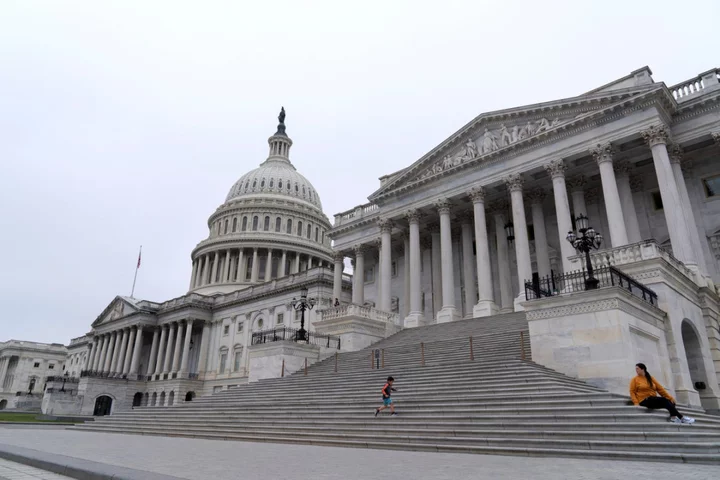
Debt limit talks seem to make little headway as Biden, world leaders watch from afar for progress
Debt limit talks between the White House and House Republicans stopped, started and stopped again heading into a weekend where President Joe Biden and world leaders watched from afar, hoping high-stakes negotiations would make progress on avoiding a potentially catastrophic federal default. In a sign of a renewed bargaining session, food was brought to the negotiating room at the Capitol on Saturday morning, only to be carted away hours later. No meeting was likely Saturday, according to a person familiar with the state of the talks who was not authorized to publicly discuss the situation and spoke on condition of anonymity. Biden's administration is reaching for a deal with Republicans led by House Speaker Kevin McCarthy, R-Calif. The sides are up against a deadline as soon as June 1 to raise its borrowing limit, now at $31 trillion, so the government can keep paying the nation’s bills. Republicans are demanding steep spending cuts the Democrats oppose. Negotiations had came to an abrupt standstill Friday morning when McCarthy said it was time to “pause” talks. Then the teams convened again in the evening, only to quickly call it quits for the night. Biden, attending a meeting of global leaders in Japan, tried to reassure them on Saturday that the United States would not default, a scenario that would rattle the world economy. He said he felt there was headway in the talks. “The first meetings weren’t all that progressive, the second ones were, the third one was,” he said. The president said he believes "we’ll be able to avoid a default and we’ll get something decent done.” Negotiators for McCarthy said after the Friday evening session that they were uncertain on next steps. “We reengaged, had a very, very candid discussion, talking about where we are, talking about where things need to be, what’s reasonably acceptable," said Rep. Garret Graves, R-La. Rep. Patrick McHenry, R-N.C. was asked if he was confident an agreement over budget issues could be reached with the White House. He replied, “No.” As the White House team left the nighttime session, Biden counselor Steve Ricchetti, who is leading talks for the Democrats, said he was hopeful. “We're going to keep working,” he said. McCarthy had said resolution to the standoff is “easy,” if only Biden's team would agree to some spending cuts Republicans are demanding. The biggest impasse was over the fiscal 2024 top-line budget amount, according to a person briefed on the talks and granted anonymity to discuss them. Democrats contend the steep reductions Republicans have put on the table would be potentially harmful to Americans, and they are insisting that Republicans agree to tax increases on the wealthy, in addition to spending cuts, to close the deficit. Wall Street turned lower as negotiations came to a sudden halt. Experts have warned that even the threat of a debt default would could spark a recession. Republicans argue the nation's deficit spending needs to get under control, aiming to roll back spending to fiscal 2022 levels and restrict future growth. But Biden's team is countering that the caps Republicans proposed in their House-passed bill would amount to 30% reductions in some programs if Defense and veterans are spared, according to a memo from the Office of Management and Budget. Any deal would need the support of both Republicans and Democrats to find approval in a divided Congress and be passed into law. Negotiators are eyeing a more narrow budget cap deal of a few years, rather than the decade-long caps Republicans initially wanted, and clawing back some $30 billion of unspent COVID-19 funds. Still up for debate are policy changes, including a framework for permitting reforms to speed the development of energy projects, as well as the Republican push to impose work requirements on government aid recipients that Biden has been open to but the House Democratic leader Hakeem Jeffries of New York has said was a "nonstarter." McCarthy faces pressures from his hard-right flank to cut the strongest deal possible for Republicans, and he risks a threat to his leadership as speaker if he fails to deliver. Many House Republicans are unlikely to accept any deal with the White House. Biden is facing increased pushback from Democrats, particularly progressives, who argue the reductions will fall too heavily on domestic programs that Americans rely on. ___ Associated Press writers Zeke Miller and Josh Boak in Hiroshima, Japan, and AP Congressional Correspondent Lisa Mascaro contributed to this report. Read More Ukraine war’s heaviest fight rages in east - follow live Charity boss speaks out over ‘traumatic’ encounter with royal aide Will Biden's hard-hat environmentalism bridge the divide on clean energy future? Russia warns of ‘colossal risks’ if F-16 fighter jets sent to Ukraine G7 'outreach' an effort to build consensus on global issues like Ukraine, China, climate change
2023-05-21 01:58

Utah mother charged with poisoning husband was more than $2m in debt, new documents reveal
A Utah mother who has been charged with poisoning her husband spent the final day of his life on calls with the Internal Revenue Service and a money lender as she struggled with around $2.5million in debt, according to newly-filed court documents. Kouri Richins, 33, is charged with murder over the death of her 39-year-old husband Eric Richins, the father of her three boys, in March 2022. Before her arrest earlier this month, she had been promoting the release of a children’s book she wrote as a grieving widow about dealing with loss. New documents filed on Thursday in Summit County, where Ms Richins is being held, offered new details about previous poisoning attempts. The documents reveal that three days after Ms Richins bought fentanyl pills in a hand-to-hand transaction in her driveway, on Valentine’s Day 2022, she “prepared a sandwich for Eric Richins and placed it on the seat of his truck with a love note”. “Shortly after consuming the sandwich, Eric Richins broke out in hives and had difficulty breathing,” the documents stated. “Eric found his son’s epipen and administered it to himself and slept. Eric Richins believed that he had been poisoned. Eric Richins told a friend that he thought his wife was trying to poison him.” The couple had been having financial disagreements, and Mr Richins had removed his wife as a beneficiary from his will and estate, according to documents. “In September 2020, Eric Richins discovered that the Defendant had obtained and spent $250,000 home equity line of credit on the Kamas home, withdrawn at least $100,000 from his bank accounts, and spent in excess of $30,000 credit cards,” the new documents state. “The Defendant had also been appropriating distributions made from Eric Richins’ business for the purpose of making federal and state quarterly tax payments and not paying the taxes. The stolen tax payments totaled at least $134,346. Eric Richins confronted the Defendant and she agreed to repay him.” In October 2020, Mr Richins consulted a divorce lawyer and an estate-planning lawyer, changing his will to form a living trust and placing his estate in control of his sister, Katie Richins-Benson, for the primary benefit of his three children. He transferred his partnership interest in his stone masonry business to the trust and replaced Ms Richins as the beneficiary of his $500,000 life insurance policy with the trust. She was unaware of this. Mr Richins also was unaware that his wife had taken out at least four life insurance policies on him totaling nearly $2m, according to the filings. In late January 2022, Ms Richins took out a new insurance policy on her husband. It was issued the following month, on 4 February. The next week she procured illicit fentanyl, according to the documents, and the sandwich incident followed days later. Ms Richins reached out again to contacts who helped her obtain illegal drugs in late February, according to documents, claiming that the “fentanyl pills that she previously provided were not strong enough and asked that she procure some stronger fentanyl”. One contact, according to documents, “initially stated that the Defendant specifically asked for ‘some of the Michael Jackson stuff’ during this request for fentanyl, but subsequently conceded that the Defendant may have made the Michael Jackson reference during her first request for fentanyl”. Through this contact, Ms Richins arranged to meet another person at a gas station to buy fentanyl on 26 February, 2022 according to the documents. On 1 March, her “outstanding state and federal tax liability was $189,840,” and she owed “a hard money lender at least $1,847,760”. She also owed her husband “at least $514,346,” the documents stated. On 3 March, she “had a lengthy telephone call with the IRS and talked to her hard money lender,” the charging documents noted. Hours later, she prepared her husband a Moscow Mule cocktail. Ms Richins told investigators that her husband drank the cocktail while in bed, and she slept in one of the boys’ bedrooms because the child was having a night terror. When she awoke around 3am, Ms Richins said, she returned to her room and found Eric cold to the touch, prompting her to call 911. While she told police she’d left her phone in the couple’s room while caring for her child, “the status on her phone shows that it was locked and unlocked multiple times and there was also movement recorded on the phone,” the documents state. “In addition, tolls and phone billing data for Defendant’s phone show that messages were sent and received during that time.” Mr Richins was pronounced dead on 4 March, 2022. Almost immediately Ms Richins, a real estate agent, closed on a multi-million-dollar mansion the couple had been arguing about. Two days after his death, she arranged for a locksmith to drill into her husband’s safe. When his sister and trustee objected, Ms Richins “became enraged and punched [her] in the face and neck,” the documents state. “Sheriff’s deputies responded and called Eric Richins’ estate planning lawyer from the scene. Here, the Defendant learned for the first time of the existence of the Eric Richins Living Trust.” Ms Richins was arrested last week and a 19 May detention hearing has been postponed until 12 June. Between her husband’s death and her arrest, Ms Richins had been fighting with his family and trust regarding his estate and, particularly, the couple’s sprawling home, where they married on 15 June 2013. Presenting herself as a grieving widow, Ms Richins also authored a children’s book titled Are You With Me? on dealing with loss. She appeared on a local TV show to promote the book weeks before she was taken into custody. Lawyer Greg Skordas, a Richins family spokesman, told The Independent on Wednesday: “It was right up until the end that she was carrying on as though nothing had happened, and that she was a victim, and she was a martyr and promoting her book. “And I don’t know to what extent she knew this was coming or suspected it, but we certainly did.” A lawyer for Kouri Richins has not responded to requests for comment from The Independent. Read More Four students stabbed to death, a weeks-long manhunt and still no motive: What we know about the Idaho murders Lori Vallow had two alleged accomplices in her children’s murders. One will never face justice
2023-05-21 00:51

Argentina: VP Cristina Fernández says she won't run for president
Argentine Vice President Cristina Fernández made it official Tuesday that she will not be running for president again, putting the brakes on an effort by members of her party to push her to become a candidate in the October election. Fernández, who was president 2007-2015, made her decision public through a statement published on her website in which she slammed the judiciary, accusing the courts of trying to forbid her from running for office again as part of an alliance with the opposition. With her decision, the center-left Fernández throws the ruling Peronist party into disarray amid uncertainty over who could be its candidate in this year’s presidential elections. President Alberto Fernández, whose tenure has been marked by an ongoing economic crisis that has included a sharp devaluation of the local currency and annual inflation of more than 100%, already said last month he would not be seeking reelection. “I will not be a puppet of those in power for the sake of any candidacy. I have demonstrated, like no one else, that I prioritize the collective project over personal ambitions,” Cristina Fernández said. The 70-year-old vice president said she’s prevented from running for office by a prison sentence of six years and a lifelong ban from holding public office she received late last year as part of a case involving corruption through public works during her presidency. She has denied all charges and the ruling still has to be confirmed by higher courts before it becomes effective. “I will not engage in the perverse game they impose on us under the guise of democracy,” she wrote. Allies of the vice president have been pushing for her to run for the presidency and regularly chant “President Cristina” during her public appearances. Although Fernández, who is not related to current president Alberto Fernández, had already said she wouldn’t run for president, she often played coy in public speeches. The vice president published her statement days before allies had announced a big rally in downtown Buenos Aires on May 25, which is a national holiday in Argentina, to push her to run. With both the president and vice president out of the running, all eyes are now likely to set on Economy Minister Sergio Massa, a center-right Peronist who has long had presidential ambitions although his tenure in the office he took on last year has not gone as he hoped. Massa had said his goal was for monthly inflation to decelerate to 3% by April. Instead, it accelerated to 8.4%. Read More Ukraine war’s heaviest fight rages in east - follow live Charity boss speaks out over ‘traumatic’ encounter with royal aide
2023-05-17 08:24
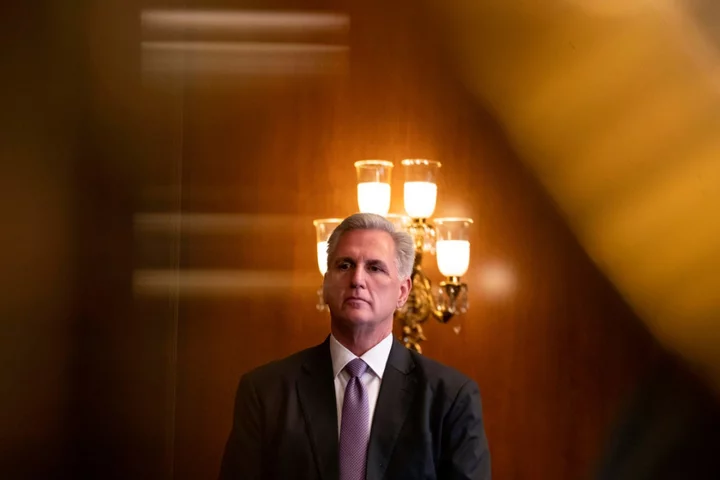
Debt ceiling showdown: Biden and congressional leaders to meet as McCarthy pushes for faster deal
President Joe Biden is ready to discuss the debt ceiling with congressional leaders at the White House in a high-profile session with reverberations across the globe as early outlines of a potential deal begin to emerge despite painstakingly slow negotiations. Raising the stakes, the Tuesday afternoon session comes as Biden is preparing to depart for the Group of Seven summit in Japan where the U.S. leadership will be on the world stage later this week. The president and House Speaker Kevin McCarthy are trying to strike a budget deal before the U.S. Treasury runs out of cash to keep paying the nation's bills, which could occur as soon as June 1. While Biden has remained upbeat that “we'll be able to do this,” McCarthy is prodding the president to move faster to avert a crisis. The Republican speaker says they need an agreement soon to avoid default. Expectations are low that a deal is that close at hand. Instead, it is more likely that staff talks will continue while the president is overseas. “I just don’t see the progress happening,” McCarthy told reporters Monday. But Biden was optimistic, saying over the weekend, “There’s a desire on their part as well as ours to reach an agreement." It's the second time in a week that Biden has met with McCarthy of California and other congressional leaders at the White House. Biden is confronting a politically divided Congress for the first time on the debt ceiling, a test for both the president and McCarthy, the new speaker, as they work to stave off an economic crisis that could come from a federal default. The meeting will also include Senate Majority Leader Chuck Schumer of New York, Senate Republican leader Mitch McConnell of Kentucky and House Democratic leader Hakeem Jeffries of New York. Even as the Democratic president and the Republican speaker box around the politics of the issue — with Biden insisting he’s not negotiating over the debt ceiling and McCarthy working to extract spending cuts — various areas of possible agreement appear to be emerging. Talks have been under way at the Capitol for much of the past week, closed-door discussions where White House and congressional staff are discussing what it would take to craft a budget deal that would unlock a separate vote to lift the nation’s borrowing capacity, now set at $31 trillion. Among the items on the table: clawing back some $30 billion in untapped COVID-19 money, imposing future budget caps, approving permitting reforms to ease energy development and putting bolstered work requirements on recipients of government aid, according to those familiar with the talks. McCarthy has complained the talks are slow-going, saying he first met with Biden more than 100 days ago and that the president should be more focused on issues at home. "An American president should focus on the solutions of America," McCarthy said ahead of Biden's trip. But Biden has insisted Republicans must rule out default and consider budget issues separate from the need to raise the nation's debt limit. The president has said it took McCarthy all this time to put forward his own proposal after Republicans failed to produce their own budget this year. The debt limit must be lifted, as has been done countless times before, to allow continued borrowing to pay already accrued bills. Compounding pressure on Washington to strike a deal, Treasury Secretary Janet Yellen said Monday that agency estimates are unchanged on the possible X-date when the U.S. could run out of cash — perhaps as early as June 1. But Yellen, in a letter to the House and Senate, left some opening for a possible time extension on a national default, stating that “the actual date Treasury exhausts extraordinary measures could be a number of days or weeks later than these estimates.” She said she would update Congress next week “as more information becomes available.” Time is dwindling. Congress has just a few days when both the House and Senate are in session to pass legislation. “It’s time for the principals to get more engaged, get their closers out there,” said Sen. John Thune of South Dakota, the Republican whip. “My impression is that they have too many cooks in the kitchen, too many people in the room and not the right people.” Details of a potential budget deal remain politically daunting, and it’s not at all clear they go far enough to satisfy McCarthy’s hard-right faction in the House or would be acceptable to a sizable number of Democrats whose votes would almost certainly be needed to secure any final deal. Republicans led by McCarthy want Biden to accept their proposal to roll back spending, cap future outlays and make other policy changes in the package passed last month by House Republicans. McCarthy says the House is the only chamber that has taken action to raise the debt ceiling. But the House bill is almost certain to fail in the Senate, controlled by Democrats, and Biden has said he would veto it. Biden did signal over the weekend that he could be open to tougher work requirements for certain government aid programs, which Republicans are proposing as part of the ongoing discussion. He has said he will not accept anything that takes away people’s health care coverage. An increase in the debt limit would not authorize new federal spending. It would only allow for borrowing to pay for what Congress has already approved. As June 1 approaches, the nonpartisan Congressional Budget Office has warned of a “significant risk” of default sometime in the first two weeks of next month. The CBO noted that if the cash flow at the Treasury and the “extraordinary measures” that the department is now using can continue to pay for bills through June 15, the government can probably finance its operations through the end of July. That’s because the expected tax revenues that will come in mid-June and other measures will give the federal government enough cash for at least a few more weeks. ___ Associated Press writer Kevin Freking contributed to this report. Read More Ukraine war’s heaviest fight rages in east - follow live Charity boss speaks out over ‘traumatic’ encounter with royal aide Pence allies launching super PAC to back former vice president's expected 2024 candidacy South Korea and Japan use G-7 to push improvement in ties long marked by animosity Wisconsin judge allows for lawsuit against fake Trump electors to proceed
2023-05-16 12:26
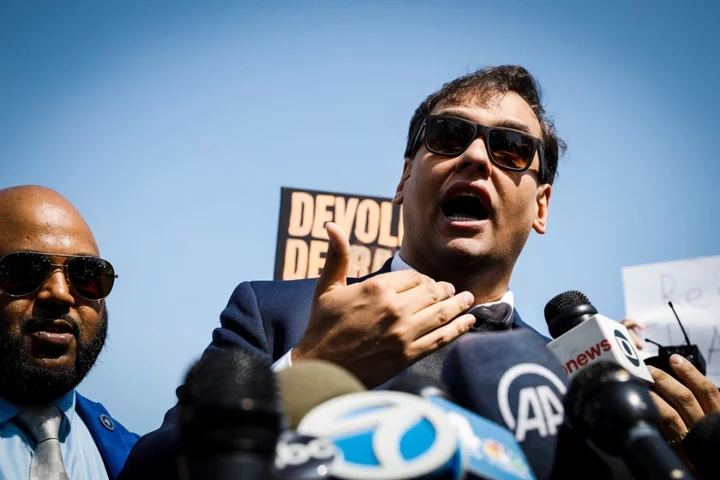
George Santos pleads not guilty to duping donors, stealing campaign cash to burnish wealthy image
U.S. Rep. George Santos, the New York Republican infamous for fabricating his life story, pleaded not guilty Wednesday to charges he duped donors, stole from his campaign and lied to Congress about being a millionaire, all while cheating to collect unemployment benefits he didn't deserve. Afterward, he said wouldn't drop his reelection bid, defying calls to resign. Santos' 13-count federal indictment was a reckoning for a web of fraud and deceit that prosecutors say overlapped with his fantastical public image as a wealthy businessman — a fictional biography that began to unravel after he won election last fall. Santos, 34, was released on $500,000 bond following his arraignment, about five hours after turning himself in to authorities on Long Island to face charges of wire fraud, money laundering, theft of public funds and making false statements to Congress. He could face up to 20 years in prison if convicted. “This is the beginning of the ability for me to address and defend myself,” Santos told reporters afterward, vowing to clear his name and calling his prosecution a “witch hunt.” Santos had said little during his arraignment, which lasted about 15 minutes. His lawyer, Joseph Murray, asked the judge for permission for Santos to travel freely for his campaign, though he did surrender his passport. Santos said he was returning to Washington for votes Thursday. Among the allegations, prosecutors say Santos induced supporters to donate to a company under the false pretense that the money would be used to support his campaign. Instead, they say, he used the money for personal expenses, including designer clothes and his credit card and car payments. Santos also is accused of lying about his finances on congressional disclosure forms and applying for and receiving unemployment benefits while he was employed as regional director of an investment firm that the government shut down in 2021 over allegations that it was a Ponzi scheme. The indictment “seeks to hold Santos accountable for various alleged fraudulent schemes and brazen misrepresentations,” U.S. Attorney Breon Peace said. “Taken together, the allegations in the indictment charge Santos with relying on repeated dishonesty and deception to ascend to the halls of Congress and enrich himself." Reached by The Associated Press on Tuesday, Santos said he was unaware of the charges. Santos has defied calls to resign — some from fellow Republicans — as details of his fictitious resume came to light, though he did decline his committee assignments. He has given no indication that he plans to step aside because of his indictment. In the past, members of Congress in both parties have remained in office while facing charges. Santos, 34, was elected to Congress last fall after a campaign built partly on falsehoods. He told people he was a wealthy Wall Street dealmaker with a substantial real estate portfolio who had been a star volleyball player in college, among other things. In reality, Santos didn't work at the big financial firms he claimed had employed him, didn't go to college and struggled financially before his run for public office. He claimed he fueled his run largely with self-made riches, earned from brokering deals on expensive toys for wealthy clients, but the indictment alleges those boasts were also exaggerated. In regulatory filings, Santos claimed he loaned his campaign and related political action committees more than $750,000, but it was unclear how he would have come into that kind of wealth so quickly after years in which he struggled to pay his rent and faced multiple eviction proceedings. In a financial disclosure form, Santos reported making $750,000 a year from a family company, the Devolder Organization, but the charges unsealed Wednesday allege that Santos never received that sum, nor the $1 million and $5 million in dividends he listed as coming from the firm. Santos has described the Devolder Organization as a broker for sales of luxury items like yachts and aircraft. The business was incorporated in Florida shortly after Santos stopped working as a salesman for Harbor City Capital, the company accused by federal authorities of operating an illegal Ponzi scheme. In November 2021, Santos formed Redstone Strategies, a Florida company that federal prosecutors say he used to dupe donors into financing his lifestyle. According to the indictment, Santos told an associate to solicit contributions to the company and gave the person contact information for potential donors. Emails to prospective donors falsely claimed that the company was formed “exclusively” to aid Santos’ election bid and that there would be no limits on how much they could contribute, the indictment said. Santos falsely claimed that the money would be spent on television ads and other campaign expenses, it said. Last October, a month before his election, Santos transferred about $74,000 from company coffers to bank accounts he maintained, the indictment said. He also transferred money to some of his associates, it said. Many of Santos' fellow New York Republicans called on him to resign after his fabricated life story was revealed. Some renewed those calls after news of his indictment. "Sooner or later, whether he chooses to or not, both the truth and justice will be delivered to him,” said U.S. Rep. Marc Molinaro, a Republican representing parts of upstate New York. Sen. Mitt Romney, a Utah Republican who confronted Santos at President Joe Biden's State of the Union address in February, said Santos should have resigned a long time ago. “I think we’re seeing that the wheels of justice grind slow, but they grind fine,” Romney said. House Republican leaders Kevin McCarthy and Steve Scalise were more circumspect, saying Santos deserved a presumption of innocence until proven guilty. Santos has faced criminal investigations before. When he was 19, he was the subject of a criminal investigation in Brazil over allegations he used stolen checks to buy items at a clothing shop. Brazilian authorities said they have reopened the case. In 2017, Santos was charged with theft in Pennsylvania after authorities said he used thousands of dollars in fraudulent checks to buy puppies from dog breeders. That case was dismissed after Santos claimed his checkbook had been stolen, and that someone else had taken the dogs. Federal authorities have separately been looking into complaints about Santos' work raising money for a group that purported to help neglected and abused pets. One New Jersey veteran accused Santos of failing to deliver $3,000 he had raised to help his pet dog get a needed surgery. ___ Farnoush Amiri in Washington and Alanna Durkin Richer in Boston contributed to this report. ___ On Twitter, follow Jake Offenhartz at twitter.com/jangelooff and Michael Sisak at twitter.com/mikesisak and send confidential tips by visiting https://www.ap.org/tips/ ___ Follow the AP's coverage of U.S. Rep. George Santos at https://apnews.com/hub/george-santos. Read More Ukraine war’s heaviest fight rages in east - follow live Charity boss speaks out over ‘traumatic’ encounter with royal aide Kevin McCarthy says he won’t support George Santos’s re-election bid after all The 13 counts New York representative George Santos faces McCarthy says he will not back George Santos re-election bid after arrest – live
2023-05-12 01:24

George Santos calls federal charges a ‘witch hunt’ and refuses to resign following arrest
George Santos described criminal charges against him as a “witch hunt” in a defiant press conference following his arrest on Wednesday. The New York congressman spoke outside a federal courthouse after being arraigned on charges of fraud, theft of public funds and money laundering. “It’s a witch hunt,” he told a crowd of reporters. “I’m gonna fight my battle, I’m gonna deliver, I’m gonna fight the witch hunt, I’m gonna take care of clearing my name,” he said, adding that he was planning to run for reelection. The 34-year-old congressman for New York’s third district, who won his election after a campaign that was littered with lies about his past, was arrested shortly after 9am after turning himself in to authorities. In the 13-count indictment, federal prosecutors accused Mr Santos of lying on financial disclosure forms he filed to the House when he became a candidate, first by overstating his income from one job and failing to disclose income from another, and secondly by lying about his earnings from his company, the Devolder Organization. Prosecutors also allege that Mr Santos fraudulently used donations to his political campaign for his own benefit, spending “thousands of dollars of the solicited funds on personal expenses, including luxury designer clothing and credit card payments.” The indictment alleges that Mr Santos’s fraud began before his successful run for Congress, accusing him of running an unemployment insurance fraud scheme in which he applied for government assistance in New York while still employed by a Florida-based investment firm. “Taken together, the allegations in the indictment charge Santos with relying on repeated dishonesty and deception to ascend to the halls of Congress and enrich himself,” Breon Peace, the US attorney for the Eastern District of New York, said in a statement. Mr Santos pleaded not guilty to the charges and was released on a $500,000 bond following his arraignment, which lasted for around 15 minutes. His lawyer said that the congressman surrendered his passport to the court. Mr Santos could face up to 20 years in prison if convicted. Read More Here are the 13 counts New York Rep. George Santos faces George Santos pleads not guilty to duping donors, stealing campaign cash to burnish wealthy image George Santos pleads not guilty to 13 charges – live
2023-05-11 03:49
